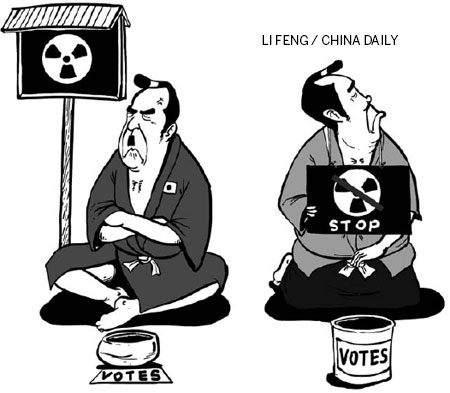
Energy is indispensable when it comes to powering human civilization, and economic and social development. It is also a strategic resource for a country's economy, defense and security. No wonder, countries across the world have been trying to figure out how to ensure a stable and continuous supply of energy.
To avoid energy risks and create an "energy security" platform, Japan has made "nuclear power generation" a priority. But the nuclear attacks on Hiroshima and Nagasaki in 1945 and the tsunami-induced accident at the Fukushima Daiichi nuclear power plant in 2011 have left Japanese people with mixed feelings on fulfilling their energy needs and the risks that come with it.
The ambivalence over nuclear power is embedded in Japanese society. On Nov 16, after Japanese Prime Minister Yoshihiko Noda announced the dissolution of the House of Representatives, the "nuclear issue" has become an important issue for the forthcoming general election.
The opposition Liberal Democratic Party's campaign manifesto, issued on Nov 21, says it will "gradually decide" on restarting idle reactors deemed safe by a new regulatory agency over the next three years and arrive at the "best energy mix" for Japan in 10 years. Though the LDP, which promoted nuclear energy during its long tenure as the ruling party, has altered its nuclear power policy, it has failed to give a timetable for Japan's shift from nuclear power.
Noda's Democratic Party of Japan, in its manifesto, has promised to end the use of nuclear power by the 2030s. It has said it will re-commission the nuclear power plants only after they are deemed safe by the new nuclear regulatory commission and not build new ones. The DPJ, of course, talks about the rebirth of Japan by paying equal attention to "zero nuclear society" and "green energy revolution", and alleges that the LDP's nuclear power policy, in essence, is to "maintain nuclear power".
The ruling and opposition parties differ on nuclear power. But none of their policies can solve Japan's nuclear power problem, because nuclear power generation is intertwined with political, economic, military, environmental and cultural issues. Besides, it has its own inherent law of development and technical requirements.
In fact, the base configuration of Japan's energy security strategy will not see any fundamental or structural change, and the country will not cease generating nuclear power completely. All factors point to the fact that nuclear power will continue to be part of the energy mix fueling Japan's economic development.
History tells us that even devastating accidents, such as the ones in Chernobyl (Ukraine) and Three Mile Island (the US), could not stop the pace of development of nuclear power. The increasing geopolitical risks associated with energy and the pressure to reduce greenhouse gas emissions have compelled countries to re-evaluate nuclear power.
And Japan will continue to use nuclear energy to power its economic development. Even Yukiya Amano, head of the International Atomic Energy Agency, has said the Fukushima accident does not mean that Japan should abandon the peaceful use of nuclear power.
Accidents in nuclear power plants are caused by human errors because of faulty designs, construction and/or operations. Every nuclear power plant accident highlights faults and teaches people to build safer plants by upgrading the safety parameters and technology. The Fukushima accident is no exception.
Japan's close-knit community of academics, bureaucrats, utility officials and financial managers with vested interests in promoting atomic power - in short, the "nuclear village" - will not disintegrate.
In the "nuclear village", many senior officials of nuclear power companies are former government officials, who not only enjoy the status of senior private enterprise managers, but also have professional experience and personal connections with government officials. Such a relationship is bound to force supervision authorities to consider the group's interests more compassionately, leading to unnecessary favors for the nuclear power companies. In other words, it can lead to the formation of a "community of interests".
As long as the "nuclear village", which has dominated the nuclear power industry for more than 60 years, does not suffer a structural damage or is disintegrated, Japan will find it difficult to phase out nuclear power. Besides, as a country that lacks sources of energy, Japan cannot abandon nuclear power if it wants to avoid energy risks and secure its energy supply.
Though the ruling and opposition parties in Japan have differences on nuclear power and vow to defend the interests of the Japanese people, their fundamental purpose is to garner votes to win the general election. The different nuclear power policies put forward by these parties are not in accordance with the essential attribute of nuclear power or its law of development. Instead, they are an attempt to play to the public gallery to win popular support. In this sense, nuclear power has become a political tool in Japan's election.
Of course, Japan's "denuclearization policy" or "pro-nuclear policy" will not affect its stance on diversifying its energy imports, "developing oil and gas fields in the East China Sea" and the dispute over "the sovereignty of the Diaoyu Islands".
The author is an associate professor on Japan studies, Nankai University in Tianjin.
(China Daily 12/03/2012 page9)